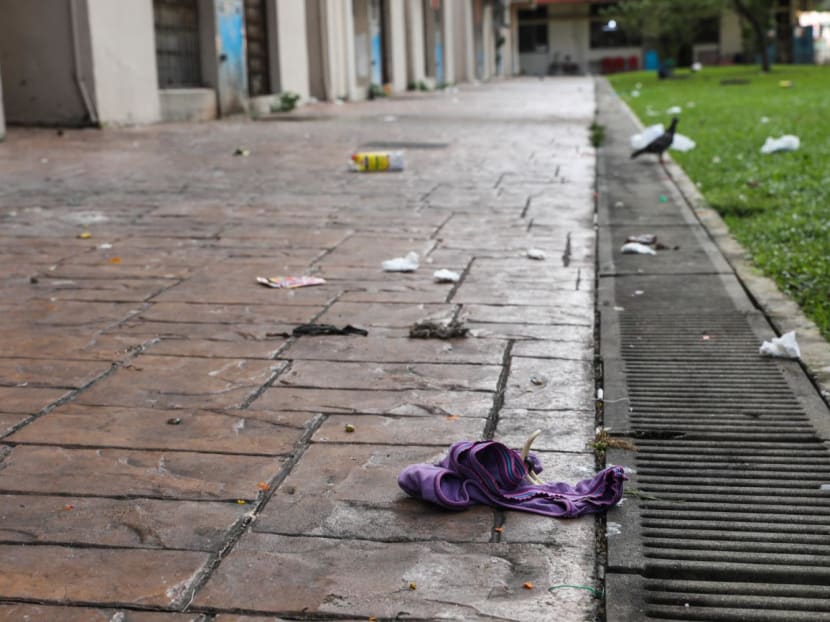Onus on flat owners, tenants to prove innocence or bear responsibility for high-rise littering under proposed law
SINGAPORE — The onus will be on owners and tenants of public housing flats to prevent high-rise littering acts from happening under a set of proposed changes to the law that were introduced in Parliament on Monday (Jan 9).

- A Bill has been introduced in Parliament that will presume that registered flat owners or tenants are responsible for any case of high-rise littering if it is detected to have originated from their flat
- However, these flat owners or tenants will have an opportunity to rebut the presumption if they have sufficient evidence against it
- If the Bill is passed, it is proposed to take effect from July 1 this year
- NEA said this presumption clause is meant to tackle the sharp increase in high-rise littering
SINGAPORE — The onus will be on owners and tenants of public housing flats to prevent high-rise littering acts from happening under a set of proposed changes to the law that were introduced in Parliament on Monday (Jan 9).
Under a "statutory presumption clause", registered owners or tenants of the flat will be presumed to have committed an offence if an act of high-rising littering has been proved to have been carried out from the unit, if the Environmental Public Health (Amendment) Bill is passed.
The proposed law will only apply to private apartments if the litter lands in a public place.
Senior Minister of State for Sustainability and the Environment Amy Khor said in Parliament in 2018 that the prohibition against littering under the Environmental Public Health Act applies only to publicly accessible places.
Private estates such as executive condominiums and private strata-titled condominiums are not regarded as such a place in law, as access to these places are restricted.
However, she said then that the management committee of such estates generally have by-laws to deal with high-rise littering, and may turn to the courts when dealing with errant residents. She added then that the Government has no plans to amend legislation and extend anti-littering laws to private estates.
As for Housing and Development Board estates, currently, if the National Environment Agency’s (NEA) surveillance cameras detect someone throwing litter out of a high-rise window, its officers will have to carry out investigations to establish who the offender is.
NEA said in a press release on Monday that currently, flat owners are only required to provide information on the identity of every occupier of the flat at the time of the offence.
“Enacting the presumption clause will strengthen existing legislation by placing greater onus on owners and tenants to prevent such acts,” it said.
NEA had investigated an average of 29,700 high-rise littering instances annually between 2019 and 2021. This is a 77 per cent increase compared to the average of 16,800 instances annually from 2016 to 2018.
In terms of the average number of enforcement actions it took each year between 2017 and 2021, NEA said it issued about 1,500 tickets — with 2020, the peak of the Covid-19 pandemic, seeing the highest number of tickets issued at about 2,000.
That said, the agency added that if the Bill is passed, either the owner — or the tenant, in cases where the entire flat is leased — will have the opportunity to rebut the presumption if they can prove they were not present at the time of the offence.
Alternatively, the presumption can also be rebutted if either the owner or the tenant can provide the identity of a person “reasonably believed to be the offender”.
Any rebuttals must be done within 14 days of being required to do so.
Notwithstanding this, the agency added that it will “ensure that the law is applied judiciously and with proper safeguards”, such as when investigating cases committed by young children, the elderly and vulnerable groups.
For instance, no enforcement action will be taken against children under the age of 12. Instead, an advisory will be sent to their parents to educate them on how to dispose of litter correctly.
As for the elderly and vulnerable, such as those who are mentally or physically disabled, NEA said it will “review and consider the relevant circumstances of each case before taking any appropriate action” against the owner or tenant, which may include the issuance of a warning.
If the Bill is passed, the proposed implementation date for the law is July 1 this year.
Under the Environmental Public Health Act, the punishment for anyone caught littering is a fine of up to S$2,000 for a first conviction, S$4,000 for a second conviction and S$10,000 for the third and subsequent convictions.
The court may also impose a corrective work order, requiring offenders to clean public areas for up to 12 hours.
OTHER AMENDMENTS
Aside from the inclusion of the presumption clause for high-rise littering, the Bill also seeks to introduce:
-
A progressive wage model for some 3,000 resident workers of the waste collection and materials recovery sub-sectors from July 1, 2023
-
A revision for the licensing framework for general cleaning businesses as part of efforts to improve capabilities and raise public health standards of such businesses. It is proposed to take effect from Jan 1, 2024
-
A mandate that requires building owners to maintain their pneumatic waste conveyance systems, which are automated waste collection systems, from July 1, 2023
-
A law that makes it an offence to cause or permit the dumping or disposal of waste in a public place, in addition to the existing prohibition on dumping or disposal of waste. Proposed to take effect from July 1, 2023, it will allow NEA to take enforcement action against supervisors who improperly instruct workers to dispose of the waste











